
Terrence Malick's THE TREE OF LIFE
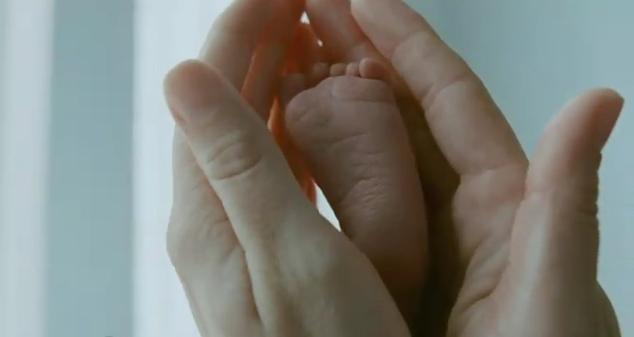
eric pfriender, marcus pinn, christopher funderburg & john cribbs
PINN:
Well, since this dialogue started, I've now seen Tree of Life four times and I still can't come to a definite conclusion if I completely like it or not.
And seriously tho...how many times is Brad Pitt gonna cuff the back of Hunter McCracken's neck? They can make a drinking game out of that.
FUNDERBURG:
Ha! I had the same reaction – I thought "Do dads actually cuff the back of kids' necks like that or is that only a movie thing?" My dad never did it. I can't see the elder Cribbs or Pfriender doing it to you guys. It just seems like actors' shorthand for "controlling and condescending; bully-ish."
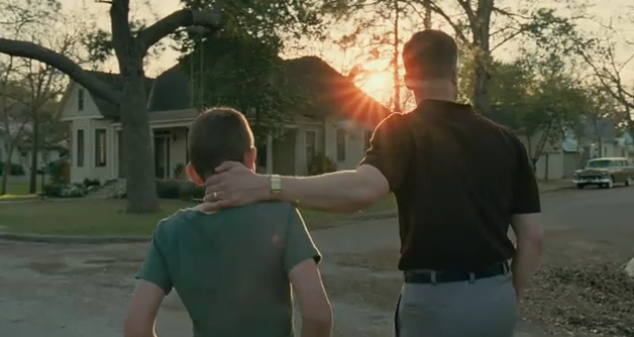
CRIBBS:
Personally I'd love to see Terrence Malick make an actual wrestling movie. Wrestlers often cuff their hands on the back of their opponent's neck, usually right before slamming their head into the turnbuckle.
As someone whose quick answer to the question "Do you like Terrence Malick?" is "yes," I tend to approach his latest release with the renewed fear that he will "Malick it up" a little too much. Because an extension of that quick answer is that my appreciation of his films and postulation that he is the most astonishingly talented expressionist ever to work in America comes with several extenuating clarifications (see how many 'ex' words I used in that sentence? wow.) Do I really buy into his aggressive pushing of holistic themes and abundance of, as Chris put it, Discovery Channel-type imagery? Can I in good consciousness allow him to get away with some of the admittedly hokey internal existentialist mumblings his characters indulge in? And as someone who believes in story and an uncluttered progression of filmed and edited events, can I get behind Malick's visualist agenda that so overwhelms his sense of narrative, as the pervasiveness of nature overwhelms the people in his films? These aren't concerns that started with Tree of Life. They started when the earth was formed, and cells joined together to create life and...well actually, they started at the beginning of Malick's career, and have gotten more exasperating and difficult to defend/excuse/ignore since his return to directing in 1998.
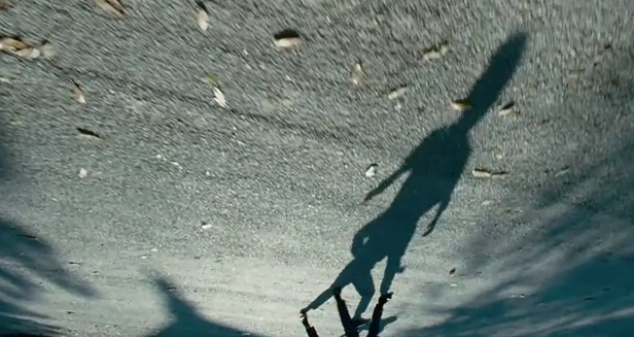
My conflicted admiration can be perfectly summed up by the first moments of The Thin Red Line. It has one of the most amazing opening shots in film history: a crocodile slinking into some green murky water until he melds with and disappears beneath its surface - danger lurking within nature, the duality of an inherently nurturing and ultimately destructive world! - but then Malick kind of ruins it by feeling it's necessary to have the voice over EXPLAIN the shot to us ("Why does nature vie with itself?") The director's trademark bits of fragmented reflection - call them Terry tweets - are always beautifully laid into the sound work, but are more often than not narratively useless and about as deep as a kiddy pool when they aren't simply grating. Part of me asks, who are we to guess what the fuck an 11-year-old boy from 1950's Waco Texas is thinking, or a teenage girl in 1950's South Dakota, or Pocahontas? The idea that these voices are echoing retroactively from heaven doesn't make the situation any better. I have long been a proponent of war films where the characters aren't constantly whining and philosophizing about what they're doing in the middle of all this madness, and Thin Red Line is obviously full of nothing but that...however, at the same time, nobody's done a better job capturing a soldier's sense of doom before, during and after a battle, or putting into visuals the concept that all these explosions and mutilated bodies are as much a part of the grand scheme of things as a leaf dangling from a tree. It's brilliant and it's moving...so why can't I help mockingly hum the lyrics to The Birds song "Turn Turn Turn" in my head as these images play on the screen?
A lot of the irksome stuff that will turn up in Tree of Life can be found at the beginning of Thin Red Line. A beach, if not a stand-in for the afterlife, is certainly meant to represent an untainted paradise on earth. Jim Caviezel (sp?) sees a Melanesian woman with her child and it reminds him that he misses his mommy (and isn't the last line of The New World something like "Mother, now I know where you live?" Malick's got mom issues.) Sunlight breaks through the leaves of a tree in the first of many, many "sunlight breaking through the leaves of a tree" shots - when Tree of Life comes out on dvd I'm going to have to count and find out which film has more of them. The point is, Malick has been on the verge of overdosing on the more blatantly mawkish and overly sentimental aspects of his transcendentalist tendencies for some time, and if there are portions of Tree of Life that put the Malickness into overdrive, it's nothing new...in fact, it was fairly inevitable, and we should all feel relieved that he showed as much restraint as he did in his previous efforts (and that there were no dinosaurs in Virginia in 1607, or tooling around the Texas Panhandle in 1916.)
On the other hand, all the good stuff was always there too. I wouldn't say Thin Red Line is the greatest war movie of all time, but it may be the best war movie made by someone who wouldn't remember the experience of living during the war itself. To wit, Tree of Life is an immaculately-observed piece of scenes from under childhood, but it's clearly memories coming from a man in his late 60s. It's the geezer who's asking why mom and dad must wrestle within the realm of his own mind, assuring the audience that "grace doesn't please itself" (if an 11 year old is thinking anything, it's probably about wanting to masturbate in a closet while people wait for pie to cool...in fact, some youtube jokster should replace the soundtrack of Tree's dialogue with Homer Simpson thoughts.) These half-remembered moments are amazing tho, all the stuff Pfriender mentioned is incredible. And the recurring shots of the swarm of children - where do they all come from? They're like mosquitoes buzzing around the neighborhood lawns, or locusts in the wheat fields. The subjective camerawork brings the audience in on this act of finding people in the world of the film, which is one reason the celebrity small parts in Thin Red Line never really bothered me: it's like, oh John Travolta, what are you doing here in this war (watching it again recently the celeb spots weren't nearly as distracting as I remembered them being; also the two big action set pieces - the raid on the bunker, the encounter with the enemy in the fog - are even more outstanding than I remembered them being. Finding the previously invisible Japanese soldiers as the movie progresses is another "where did these people come from?" moment of existentialism that works on the same level.) From a character standpoint, Brad Pitt as the well-intentioned bully character is directly related to Nick Nolte's, an officer who even tries to be a father figure to John Cusack ("You're like a son to me. You know what my son does? He's a bait salesman.") Thinking of that connection makes the Clooney scene seem more relevant, since he asserts himself as the company's new 'father.' This is the role Kit takes in Badlands and even Bill in Days of Heaven - they're intelligent and ambitious/creative individuals who can't help but fuck everything up for everybody. And honestly, mommy dancing/flying was no worse than the upside down shot with the wife on the swing in Ben Chaplin's memory, which I still remember seeing in the preview and instantly loving.
In Jonathan Rosenbaum's excellent article "Malick's Progress" (within which he offers high praise to Small Soldiers - awesome), he talks about the obvious influence of silent movies - especially Murnau - on Malick's mise en scene. Honestly I could watch all the footage from fifteen or so minutes Pfriender mentioned with no sound at all, even though the music selection during this section is undeniably incredible. Emmanuel Lubezki deserves as much praise as the director: some of the film language on display here reminded me of Ali, and praise just doesn't get any higher than that. However it would be myopic (intransigent, to say the least) for me not to agree with Chris that the aesthetic of Tree of Life owes a lot to Robert Beavers and Maya Deren, on top of the visual as well as thematic debt it owes to films like Tabu (the glory of nature vs. the mediocrity of modern life etc.) That doesn't take anything away from the movie, I just wouldn't nominate it for any originality awards. Tree of Life did not tell me anything I didn't already know about being a confused and angry young man or a lonely and mumbly architect, any more than Thin Red Line told me anything I didn't already know about World War II. That's not Malick's thing. Likewise, he has no interest in converting anybody to the Christian faith any more than Dreyer or Bresson did - they're transcendentalists, and the religious stuff you're free to take or leave. Sure, some of the Christian symbolism in his work is egregious, such as Caviezel prematurely making like Jesus and sacrificing himself to save everybody (which was not taken from the book, it was invented by Malick) but I don't think it's all cut and dry. My read on the parents in Tree of Life was that the mother was actually sort of awful; that her free-spirited Garden of Eden wholesomeness was the thing that was really screwing her children up. "That's where God lives" felt puritanical to me. I think if my mom pointed to the sky and said that, my reaction would be "holy shit, what's God doing watching me from an invisible tower up in the clouds? You're scaring the shit out of me, mom." (Then she'd send me to my desert door for swearing.)
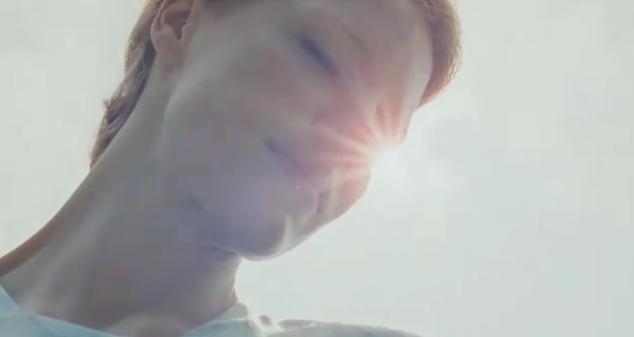
The father is harsh, but he's the one trying to instill some kind of order and growth in his sons, in a way only a 1950's American dad knows how. The moment where he flips out at the dinner table and grapples with the mother is the sort of uncertain balancing of parenthood that happens in lots of family - it certainly did in mine. Rather than embrace the mother's fruity new age twirling-on-the-grass method of parenting, I'd like to think that Malick is showing two wrongs ways of raising a child: without inhibition (which leads to breaking & entering and frog rocket-launching) and with a hand that's just slightly too firm (which leads to mutiny and possible mind wrestling.) What I really have against the "of universal importance" and "tears in heaven" bookends is how much they undermine this theory. I want to think that Malick doesn't believe it's as obvious as "all you need is love" or "mom washing her feet with the garden hose is the apex of innocence" messages - that maybe that's how a kid thinks and maybe that kid is wrong. That a kid who can't find a happy medium between these two sides of growing up may find life frustrating and terrible. In the end, what Malick really wants to examine is why, in this beautiful world, with life such a majestically impossible dance between science and miracle, would anyone want to commit suicide?
I just kind of assumed everybody would hate the "dawn of time" sequence and the final 15 minutes because there's nothing to like about them. I'm curious, Eric...being on the record as a 2001-hater, how do you think these parts compare to, say, the "Jupiter and beyond" sequence?
PFRIENDER:
We should put him on the Wallace beery picture.
PINN:
Another Mr. Show reference, nice.
And John, I thought you had The New World on your Top 10 of 2005. Has your opinion on that changed?
Also, a Terrence Malick wrestling film wouldn't work out too well. Two wrestlers fighting it out in the middle of a big wheat field, with whispery ringside commentary.
FUNDERBURG:
"Two wrestlers fighting it out in the middle of a big wheat field, with whispery ringside commentary." That actually sounds like the end of Sanshiro Sugata, which is objectively awesome.
Look, I think Malick's problem, exemplified by Tree of Life, is that he is at his absolute worst when he Thinks Big. When his films are small and specific, there's no one as good as him. And by "small and specific," I even mean stuff like the magnificent, epic battle scenes in The Thin Red Line – those battles have the vividness and power of a traumatic memory, there's something deeply personal about their immediacy. When Malick keeps his feet on the ground, that's when he's most transcendent. Call it the Godard problem: the more philosophical and meaningful he tries to be, the less essential his work becomes. That is, his supposedly complex ideas and big themes are cluttered, silly and soft-headed, if not outright incoherent. The best that can be said of when he goes space-age mystic on his films is that those moments are not uniformly idiotic and don't necessarily ruin his movies. But circular logic and space-y hippy thought bubbles are so ingrained in Malick's work that I'm afraid he doesn't understand they're getting in the way of what makes him great. He doesn't even need to drop this stuff altogether, he just needs to scale it back and understand that that crap is the garnish, not the meal and all of the brilliance of Tree of Life is located in Waco Texas, in frog rockets and underwear drawers, that the dinosaurs and Heaven beaches are a cute supplement (at best) but what is really blowing the doors off of audiences is the true, simple, human stuff.
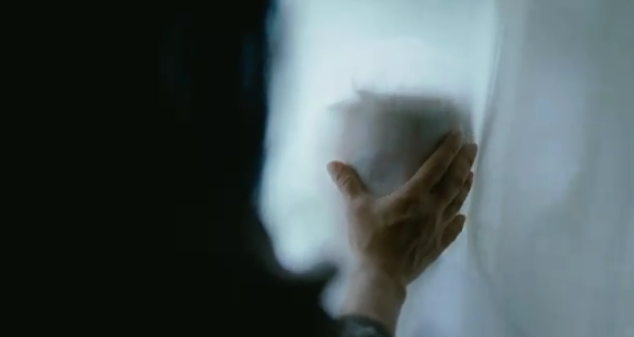
In a funny way, I'm hoping the audience distaste for this film (and, believe me, in the past 10 years no movie has generated a more enraged response from audiences out at the JBFC than this one) makes Malick step back from the precipice of irredeemable metaphorical garbage and reconsider what he's doing. It would be a shame if I had to spend another couple decades Godardin' him; i.e. suffering through his mushy, pointless philosophical messes just because his early work rules up and down the court. Who knows, the film is also a critical and financial success, so we might be seeing his Masculine/Feminine, the moment where his forever plunges into hard-to-swallow self-indulgence. I sure hope not. I think we can all agree that whatever the virtues and failings of Tree of Life, the world doesn’t need another film like it; one is more than enough.
CRIBBS:
Probably not, right? I mean despite its reception at Cannes, it won the Palme d'or (which must have been a particularly huge moment in the life of someone who loves leaves as much as Malick does) and has gotten almost nothing but "I understand you, film!!!" responses from the big critics here in the U.S. If anything, next time the rollicking primordial ooze sequence will last 2 hours and there'll be even more dinosaurs laying around. He'll be thinking even Bigger than ever before. I doubt the JBFC audience will sway him...that's the perk of being reclusive, you don't have to face the wrath of the disgruntled filmgoer (can you imagine him at a Burns Q & A?)
I still like The New World, but I've cooled on it considerably since seeing it the first time. It certainly doesn't hold up against Thin Red Line. Although the fact that he excised 20 minutes from that film suggests that maybe he is somewhat susceptible to popular critique...I don't know. Mr. Malick, if you're reading this, please at least consider losing the desert and beach finale of Tree of Life. And re-shoot Sean Penn's sequences with the great Hunter McCraken wearing a mustache or something, or ask Brad Pitt how they did those aging effects in Benjamin Button.
Terry Malick...wrestling picture! What do you need, a road map? Personally, I'd like to hear what Jim Ross' interior monologue would be during an epic Smackdown! match. "John Cena and The Miz...always you wrestle in the Hell in a Cage of my mind..."
PINN:
I think Malick would reunite with Sissy Spacek for the role of ringside announcer in his wrestling film.
CRIBBS:
Now that I'd definitely see!
PFRIENDER:
I'm with John as far as the reception of the film goes. Malick is not reading this, and he's not hanging outside of any theaters. I'm sure, from his perspective, the movie is a resounding success. He won the Cannes film festival, and as much as any rational person is aware that contests in which works of corporate-funded art vie for supremacy are fucking ridiculous, it still feels good to win things and it must be validating, and it feels nice to be validated, and the criterati have certainly anointed it as a success. But who the fuck knows what he's thinking? He clearly used Brad Pitt to seduce some suits into financing the thing, and its not his fault if the suits used Pitt to hoodwink audiences into coughing up some summer dollars to see the thing. If nothing else, he clearly made the movie he wanted to make and wasn't taking too many notes from people who might be concerned with what the general public might be thinking, and the idea that he is naive enough to think the film is the kind of thing mass audiences would embrace whole-heartedly is one I have a hard time believing. The irony, of course, is that while its form is clearly off-putting, its content and themes place it firmly as the most bible-belt friendly Hollywood production since Mel Gibson made that homo-erotic torture-porn movie about Jesus.
Anyway, I obviously can't speak to what Malick thinks or doesn't think. What I can speak to is my aforementioned hatred of 2001, which, in the published version of this email thread, John will hyperlink to here. If I had known Terry was going to throw in a thirty-minute-long sequence about the origins of the universe and the precious life contained therein, and that everyone would instantly compare his new film to 2001, I would have chosen a different "classic film that I think is terrible" to write about. (Probably The French Connection, if anyone is interested. I've never been able to finish it.) Beacaus know I face the unenviable task of defending a very similarly pretentious sequence to the one that puts a cap on Kubrick's ridiculous epic.
I think the "beyond Jupiter" section of 2001 is terrible. Obviously, part of the problem is that the film and its effects (in this sequence) have not aged well. But I thought the rest of the movie was terrible. The sequence in Kubrick's film also seems to have nothing on its mind other than "this trip is getting trippy!" There's a bit more going on in Tree of Life.
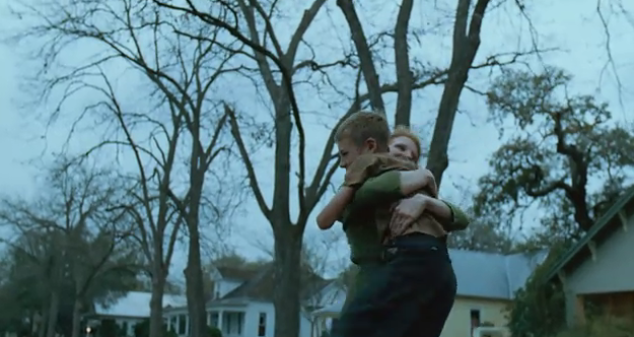
Chris says that the sequence contains nothing we haven't seen before on Discovery-style documentaries, and the images are aided a great deal by the swelling classical score, and this is more or less true. And the same pretentiousness argument applies to Tree of Life that applies to the "monkeys learn to use tools" or "beyond Jupiter" sequences from 2001. But... if you'll indulge me in isolating the sequence to just before the dinosaurs pop up, which is another thing altogether due to its CGI issues, the Origin of the Universe sequence works for me. Yeah, I've seen this stuff before. But I've never seen is butted up against the stuff that follows it. And whether or not the sequence itself is moving for you, it informs the next section so directly that I was just incredibly moved, and I honestly think that it is one of the reasons that the first movement of the Waco section resonated with me so strongly. Seeing the planet cool, then the first cells start to work together, to the first beating heart and working organs behind translucent flesh... then that shot of Father in awe of his newborn child's foot... is there some better way to talk about the miracle of existence? All the weird evolutionary quirks that needed to happen for us to be here, the idea that this ball of whatever fell into the exact right orbit at the perfect distance from the sun to cool and stay at the right temperature to foster an environment that can sustain life, and that life started as a cell and somehow turned into a land-roaming lizard, which somehow led to us, and then generations and generations of humans procreating through the ages until your mother meets your father and one specific sperm hits one specific egg so that they wrestle inside of you for your entire existence in which you are totally confused and have no idea, really, about what came before you and so you spend your childhood in various states of wonder, discovery, and awe, gradually giving way to fear, distrust, confusion, and despair, and so you distract yourself with your weird domestic concerns, have your own kids, and die. These might be sophomoric observations about "the meaning of it all," but they are only sophomoric because at some point or another, we all think about them, and the sheer magnitude of it is terrifying, so we usually just shrug and change the subject. Well, that subject is what Terry wanted to make a movie about. And maybe he shouldn't have bothered, and maybe there were better ways to do it, but he decided to do it this way. And I, for one, was moved.
So that's my take on that sequence, which I like. That said, the more we dig in to this discussion here, the more I agree with you guys that there is a really, truly brilliant film lurking in here somewhere. Like, Killer of Sheep brilliant. Like one of the only films that matters brilliant. That film is basically "My younger Days Growing Up in Waco." And all of this other stuff that we're arguing about may well be ruining it. I can go on all day about how "this works for me," and "this bit is silly," but at the end of the day, how fucking amazing would the film be if it was just the ninety minutes in Waco without any of this other stuff that may or may not be ridiculous?
Basically, I agree that if Malick could just ground himself in his narrative (however loose he wants that narrative to be) his films would be better for it. And they would maintain the transcendence that he keeps chasing, and has now resorted to forcing on his audience. Look at his various "heavens." In Thin Red Line, heaven is going AWOL, going native, and living on the beach. Its swimming in the ocean, playing wheelbarrow with kids, its the feel of the sun on your forearm. And it works, because it is still grounded in the narrative. It's "heaven" for Witt, but its not Heaven for us. It's still a couple of soldiers going AWOL. Same thing with Badlands. Before the bounty hunters spoil it, Kit and Holly have their own little "heaven" in their tree-house, away from a judgmental society and the consequences of their actions. Malick's version of Heaven, when he keeps the grounded, are always places where the characters basically drop out and get back to nature (also see: John Smith leaving the fort and spending a few weeks frolicking with an underage "natural"). I had my own little Malick transcendence moment today, while contemplating this and reading your email responses in my back yard, I had a brief flash of "happy," just the sun on my arm, a bird chirping in the distance, and all I could see was a bunch of sky while I was literally thinking about Heaven, or at least Malick's Heavens. And one of my happiest moments was on a beach, a few days after I got engaged, just me and my fiancé and the sun and the ocean. So I get it, and these moments work for me. But in Tree, Heaven isn't grounded, and its asking too much for the audience to indulge in literally leaving this plane of existence. And its a weird decision to do so, considering that the Origin of the Universe sequence is actually the opposite of that: its an attempt to ground what should be inconceivable in the concrete. All of the things we see in that section of the film, to some degree, actually happened. You know what I don't think actually happened? People reuniting with their family on a fucking beach after they die. They break down, decompose, and their cells and energy turn into grass, which is then eaten by another animal, which is then killed to feed another human, and the whole crazy world just keeps on spinning, just like that whole earlier section of your film was trying to explain, and their anguished souls are finally at peace, parents no longer having a WWE-style smackdown inside of them.
On a side-note, I would like to thank John for suggesting that this be an email-style discussion rather than a proper "essay," which largely relinquishes me from the burdens of revision or even shaping what turned out to be a pretty rambling stream-of-consciousness rant. And in a related note, I apologize to anyone still reading this.
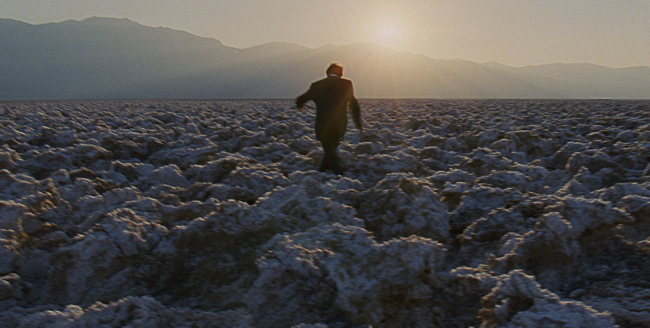
FUNDERBURG:
Eric, nobody in this discussion was confused about what Terrence Malick was attempting. It just so happens that we all think he failed very miserably at times - The Tree of Life isn't a mystery, it's a mess.
<<Previous Page 1 2 Next Page>>
home about contact us featured writings years in review film productions
All rights reserved The Pink Smoke © 2011